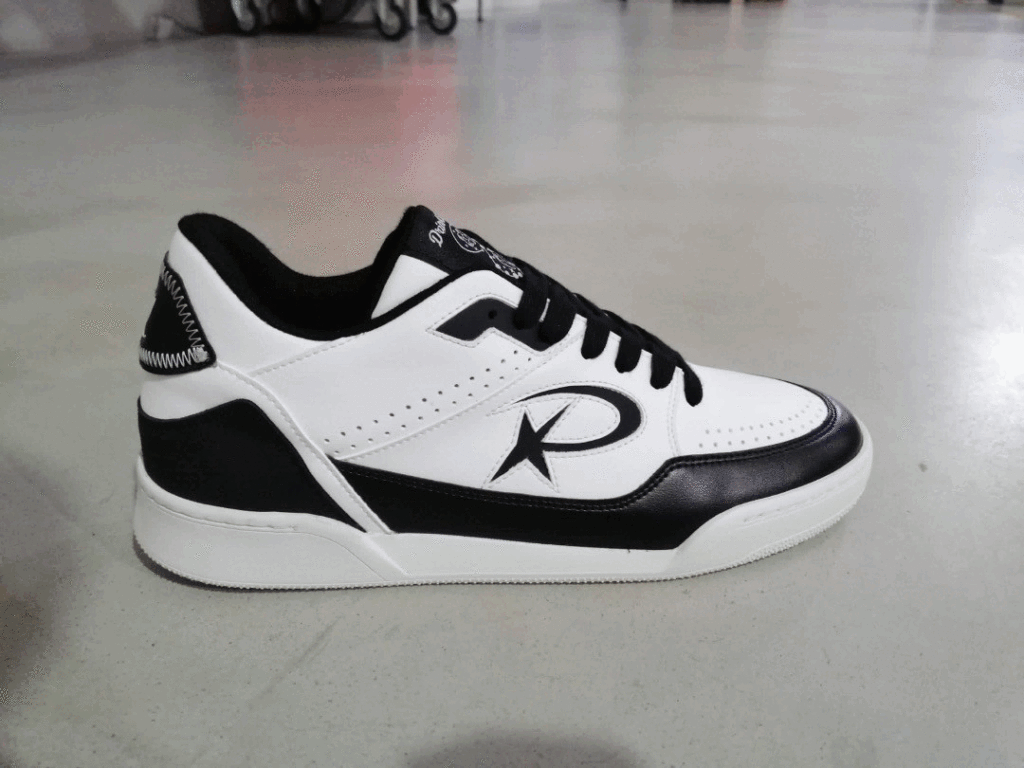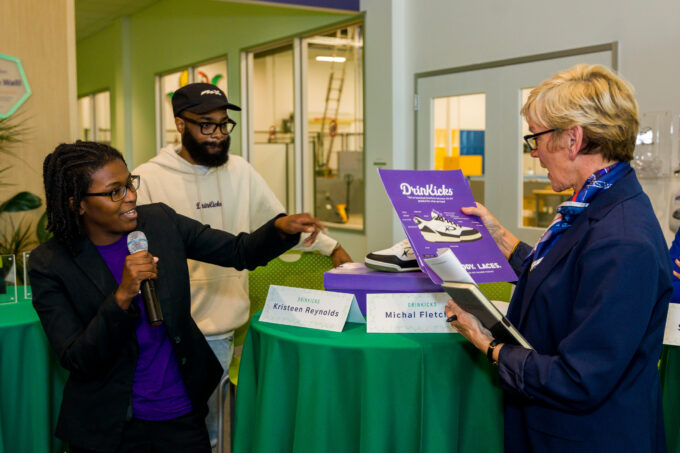Two sneaker enthusiasts met in a Clubhouse chat room. One of them said: “People should learn through shoes.” The rest, as they say, is history.
Michael Fletcher and Kristeen Reynolds are bringing their passion for sneaker culture, circularity, and community engagement to the pavement with DrinKicks—a startup turning food waste and recycled materials into shoes with 89 percent lower carbon emissions than their cow-leather counterparts.
The team’s motto is “From the fridge to the closet.” DrinKicks’s sneakers are made of waste from apples, corn, bamboo, and cotton, along with recycled rubber and 100 percent post-consumer plastic bottles—also known as RPET, a plastic that is completely recyclable and requires a fraction of the manufacturing and processing energy that traditional plastics need.
With circularity in mind, the startup’s also developing a take-back program where people will be able to drop off their old DrinKicks shoes to be broken down and repurposed into new pairs.
Can’t wait to get your hands on a pair? DrinKicks will begin selling its sneakers this fall; follow the startup on Twitter and Instagram or sign up for its newsletters to hear when the shoes become available.
Creating climate-friendly shoes and getting them out into the world is only a piece of DrinKicks’s mission. The team is wholeheartedly dedicated to educating people on circularity, merging climate-conscious fashion with sneaker culture, and elevating Black and Brown individuals’ involvement in the sustainability movement. Sneaker culture has been built and defined by Black culture, and DrinKicks is ready to meet communities of color where they are and engage people in climate action that’s personally meaningful.
“People of color are not highlighted in the sustainability movement; they’re there, but they’re not promoted,” Fletcher, DrinKicks’s Chief Imagination Officer, says. “You do have a lot of new brands that are disrupting the current environmental justice landscape and inspiring other Brown and Black people to be more sustainable, or have more sustainable style. We want to celebrate those people, who are creating these sustainable textiles, who look like us.”
“We are education-first; we use sneakers as our medium,” says Reynolds, the startup’s CEO. “A big part of DrinKicks is teaching micro-actions.”

Think community engagement and education is too tall a task for a sneaker company? Think again. Reynolds and Fletcher’s initiatives range from embedding chips in the shoes that will inform wearers about the materials and carbon reduction associated with their individual pair, to sneaker-repair drives that will give second lives to people’s current kicks, to helping school kids experiment with sneaker design. They’re developing a web interface that will allow people to personalize their DrinKicks, while learning how each adjustment will impact the shoes’ materials, dyes, and carbon impact.
DrinKicks is part of the inaugural cohort of ACCEL—an accelerator from Greentown and Browning the Green Space (BGS) designed to support BIPOC-led startups by offering access to funding, networking connections, resources, and opportunities that structural inequities put out of reach. The program combines acceleration with a curated curriculum, incubation through Greentown membership, and extensive mentorship from Greentown and BGS’s networks of industry experts.
The startup has received its second prototype, and one of its major focus areas during ACCEL is getting investor-ready.
“It’s been great to have that support and have sounding boards and be able to talk to different mentors,” Reynolds says, adding that the accelerator’s grant funding will help DrinKicks release its shoes this fall.
She also notes the opportunities that have come with Greentown membership, including meeting U.S. Secretary of Energy Jennifer Granholm.
“We had been a member of Greentown for 10 days, and we had the opportunity to meet Secretary Granholm. We have a picture of her holding the shoe. We joked that we can’t really top that.”
The co-founders emphasize that DrinKicks is “big on collaboration over competition,” and encourage any organizations that would like to engage with them to get in touch.


